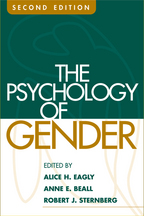The Psychology of Gender
Second Edition
Edited by Alice H. Eagly, Anne E. Beall, and Robert J. Sternberg
Paperback
Paperback
orderAugust 19, 2005
ISBN 9781593852443
Price: $48.00 358 Pages
Size: 6" x 9"
Copyright Date: 2004
“It is rare to see a volume that does justice to the diversity of approaches to the psychology of gender. The Psychology of Gender, Second Edition, encompasses biological, psychological, sociological, and cultural approaches to central issues in a rapidly developing field, showcasing the increasing maturity of theory and research. From the discussion of biological influences in gender as fluid and dynamic, to the enhanced coverage of the subtle influences of power and status on gender differences and similarities, the volume will challenge students' preconceptions and open their eyes to the ways in which gender structures our social world.”

—Peter Glick, PhD, Department of Psychology, Lawrence University
“This stimulating, rich volume reflects the full array of gender theories, from hormones and evolution to socialization, social roles, identity, and culture. Classroom instructors, students of gender, and colleagues catching up on the latest research in this popular area will all find this second edition an invaluable, provocative resource.”

—Susan T. Fiske, PhD, Department of Psychology, Princeton University
“This second edition expands its scope beyond its original emphasis on biology, evolution, and socialization to embrace more fully the social context in which gender is enacted and perceived. Offering a comprehensive exploration of the psychology of gender, the volume promises to serve as a solid basic text for graduate studies as well as a resource for scholars in the field.”

—Jan Yoder, PhD, Department of Psychology, University of Akron
“I use The Psychology of Gender as a recommended text in 'Clinical Practice with Women,' an advanced graduate clinical social work class. This book provides a research-based scientific and theoretical overview of the role of gender—psychologically, physiologically, socially, and culturally—and I find it a helpful framework for our students.”

—Shoshana Ringel, MSW, PhD, School of Social Work, University of Maryland, Baltimore
—Peter Glick, PhD, Department of Psychology, Lawrence University
“This stimulating, rich volume reflects the full array of gender theories, from hormones and evolution to socialization, social roles, identity, and culture. Classroom instructors, students of gender, and colleagues catching up on the latest research in this popular area will all find this second edition an invaluable, provocative resource.”
—Susan T. Fiske, PhD, Department of Psychology, Princeton University
“This second edition expands its scope beyond its original emphasis on biology, evolution, and socialization to embrace more fully the social context in which gender is enacted and perceived. Offering a comprehensive exploration of the psychology of gender, the volume promises to serve as a solid basic text for graduate studies as well as a resource for scholars in the field.”
—Jan Yoder, PhD, Department of Psychology, University of Akron
“I use The Psychology of Gender as a recommended text in 'Clinical Practice with Women,' an advanced graduate clinical social work class. This book provides a research-based scientific and theoretical overview of the role of gender—psychologically, physiologically, socially, and culturally—and I find it a helpful framework for our students.”
—Shoshana Ringel, MSW, PhD, School of Social Work, University of Maryland, Baltimore



